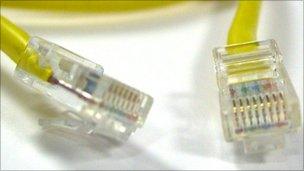Judge considers costs for ACS Law
- Published

ACS Law was heavily criticised by the judge in an earlier judgement on the case
Controversial law firm ACS Law returned to court on Wednesday as the cases it brought against alleged file-sharers were officially closed.
Andrew Crossley, the solicitor at the heart of the controversy, was absent from court but could still face heavy fines.
Judge Birss is considering whether ACS Law should pay the defendants' costs.
Ralli, the law firm which represents five of the accused, is seeking £90,000.
It is unusual for a judge to impose so-called wasted costs and only happens when legal representatives are considered to have acted improperly.
ACS Law was heavily criticised by Judge Birss in an earlier judgement on the case.
The normal procedures for apportioning costs may not apply, he warned at Wednesday's hearing.
"If ever there was a case with conduct out of the norm it was this one," he said.
Speculative invoicing
Mr Crossley has faced a barrage of media scrutiny since he began sending letters to alleged file-sharers in June 2009.
At least 10,000 people are believed to have been contacted by his law firm.
Consumer watchdog Which? highlighted several cases where people claimed to have been wrongly accused.
Critics increasingly accused Mr Crossley of pursuing a letter-writing campaign against alleged net pirates as a way of making money - so-called speculative invoicing - with no intention of ever bringing them to court.
People receiving letters were offered the chance to pay a fine of around £500 per infringement.
This view was given validity when Mr Crossley brought 27 cases to court but sought to discontinue them at the last minute.
A frustrated Judge Birss refused to allow the cases to be dropped and instead put the methods of ACS Law under the spotlight.
He accused the firm of seeking "to avoid judicial scrutiny".
At a hearing in January, Mr Crossley dramatically withdrew from the cases, saying he no longer wanted to pursue illegal file-sharers because of the "immense hassle" it was causing him and his family.
Bleak House
His barrister Paul Parker argued in Wednesday's court hearing that he should not be liable for costs.
He said that Mr Crossley's file-sharing case load had operated at a loss, with Mr Crossley claiming to have spent £750,000 on pursuing net pirates while making £300,000 from people paying fines.
Guy Tritton, barrister for Ralli, countered that the way ACS Law had conducted the cases amounted to "an abuse of process" and drew parallels with Charles Dickens's famous courtroom drama Bleak House.
"Dickens's view that the one great business of British law is to make money for itself is apposite in this case. The primary purpose of the letters was to make money for ACS Law," he said.
As well as proving to be a fascinating courtroom drama, the case has wider implications as governments around the world grapple with how to deal with the issue of copyright infringement.
The cases have brought into question whether an IP address - the numerical code which identifies the network connection a person is using - can be used as evidence in court.
The UK's Digital Economy Act, set up in part to deal with illegal downloading, is facing its own judicial review next week, with ISPs BT and TalkTalk claiming that the measures introduced to chase illegal file-sharers "simply won't work".
A group of MPs will hear evidence next week as it takes its own look at the Act.
Meanwhile Mr Crossley is under investigation by the Solicitors Regulation Authority.
The Information Commissioner is also considering whether ACS Law should be fined for a data breach, which saw the details of the people who had received letters and the pornographic films they are accused of downloading exposed online.
Law firm Ralli is considering pursuing a group action for harassment against ACS Law.
- Published25 January 2011
- Published4 February 2011
- Published8 February 2011